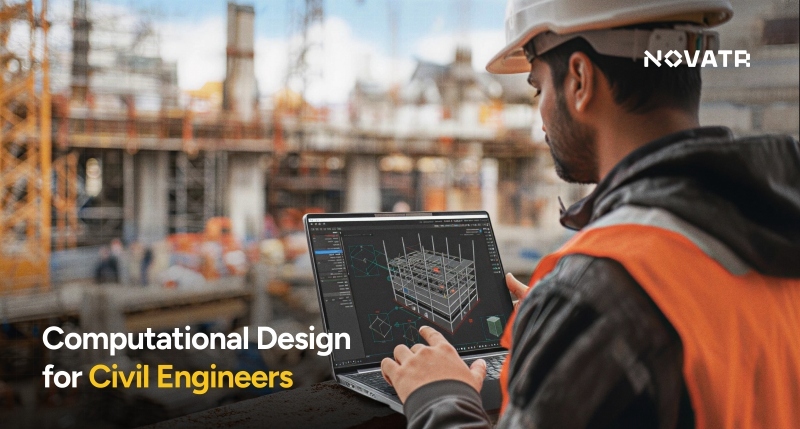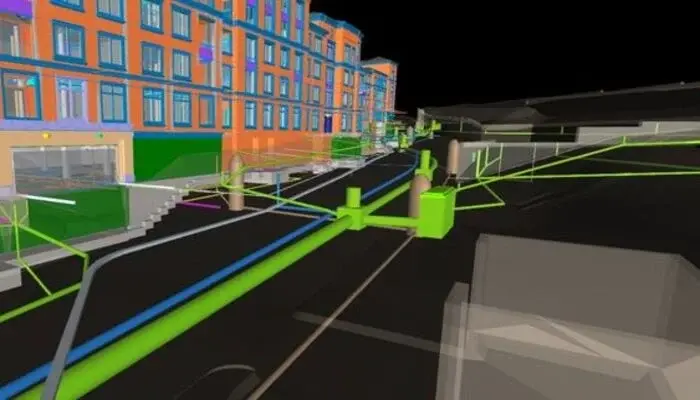
As the construction industry rapidly evolves, BIM courses for civil engineers in Kerala have become increasingly essential. These courses equip engineers with the skills needed to implement Building Information Modelling (BIM), a technology that is revolutionizing the AEC (Architecture, Engineering, and Construction) industry. BIM enhances the efficiency, collaboration, and productivity of construction projects by enabling real-time data sharing, precise visualizations, and accurate simulations.
As Kerala embraces digital transformation in construction, engineers who are proficient in BIM tools and processes will be better prepared for success in an increasingly competitive job market. Enrolling in a BIM course for civil engineers in Kerala ensures that professionals stay relevant, gaining knowledge and technical expertise that will drive their careers forward in the ever-changing landscape of construction.
What Is Building Information Modelling?
How do you think these skyscrapers that stand tall and intimidate urban fabrics are being built? How long do you think the tallest building in the world, Burj Khalifa, took to be constructed?
The answer is six years! And the how is simple - Building Information Modelling or BIM.
While we all are trying to map out urban planning, the infrastructure is bound to grow with the growing demands. We need to catch up, and create functioning spaces as per requirement. For the construction part of buildings, we focus on skilled labour, automation, safe tools, and so much more. But what do we do about the designing, management, and optimisation?
WE BIM!
In this blog, we will learn how BIMming is equally important for civil engineers and how BIM courses for civil engineers can be helpful when it comes to upskilling and staying relevant in the construction industry.
Building Information Modelling or BIM, is synonymous with collaboration and is a holistic approach to designing buildings in today’s day and age. BIM is a process that helps in creating a virtual twin, which is used in planning, designing, constructing, and operating a building via information. BIM also allows various stakeholders to visualise and experience a simulated rendered vision that helps them identify any potential clashes.
After project completion, BIM assists with precise geometry and relevant data information. This data helps with procurement, fabrication, design, operation, construction, and maintenance.
BIM becomes an indispensable tool for designers, and any other stakeholder involved in the construction project. While that is true, it is equally important for civil engineers to learn these tools and processes and enrol in BIM modelling courses. This would result in better collaboration, communication, optimisation, and time and cost efficient processes.
What is BIM for Civil Engineers?
Civil Engineering is a professional discipline that aligns with design, construction, and maintenance of infrastructure projects such as canals, bridges, roads, dams, airports, sewage, pipelines, and railways. Many engineers are under the misconception that ‘building’ in Building Information Modelling only concerns buildings, but this is far from the reality. The benefits of BIM in civil engineering are broad enough to be utilised in the construction project lifecycle.
BIM is used in a construction project lifecycle in the following ways:
-
Conceptualisation
-
Capturing site conditions
-
Detailed Designing
-
Performing Analysis and Simulations
-
Coordination and Collaboration
-
Cost Reduction
-
Clash Detection
-
Improving sequencing and scheduling
-
AR/VR
-
Repairs, maintenance or any improvements
This broad spectrum of application makes BIM courses for civil engineers in demand and something that is a must with the coming wave of digital technologies.
What are the Future Prospects of BIM
BIM has been in the spotlight in recent years, with the market size growing at a Compound Annual Growth Rate (CAGR) of 15% over a span of seven years. Building Information Modelling is making its place as a transformative force in the Architecture, Engineering, and Construction (AEC) industry. With the growing need of BIM as a technology, the requirement for skilled BIM professionals is also rising exponentially. As a result, this also guarantees high-paying jobs and a mandatory skill for an aspiring individual in the industry. Right and timely upskilling makes a promising career and requires enrolling in a BIM course for civil engineers and learning the in-trend tools and processes.
The Scope of BIM Courses
Building Information Modelling is a process that empowers stakeholders involved in a construction project, enhancing collaboration in a single 3D model. Many regions have started reaping the benefits of BIM in a construction project lifecycle and have shifted to comprehensive techniques from traditional methods.
And with the growing demand for using such processes, the need for skilled professionals is bound to expand. And at a point like this, BIM courses for civil engineers become the wand that makes buildings happen! With these courses, students or professionals learn navigating dynamic construction technology and take a step beyond technical proficiency, by understanding construction elements, learning management, collaboration, and so much more.
Top 5 BIM Courses in Kerala
We understand that going through endless links and finding a BIM course in Kerala can get overwhelming. Let’s read through this list of BIM courses for civil engineers and explore what these institutes have to offer to help one upskill.
1. Novatr
Course Name: BIM Professional Course for Civil Engineers
Mode: Online
Duration: 7 months
Fees: 1,95,000
Certification: Triple-certification
Novatr stands out as the best BIM training institute in Kerela, offering industry-certified courses to help civil engineers excel in their careers.
Build a future-ready career in construction with Novatr’s BIM Professional Course for Civil Engineers, a hands-on, industry-aligned program designed to help you master Building Information Modeling (BIM) from design to execution. Learn how top global firms use BIM to plan, coordinate, and deliver smarter, more efficient projects, while gaining the technical confidence to work on large-scale infrastructure and building developments.
Here’s what you’ll learn:
- 5+ industry softwares, including Autodesk Revit, Navisworks, Autodesk Construction Cloud: Docs, Coordination & Collaboration.
- Master essential plugins such as EF-Tools, DiRoots.One, pyRevit, ProSheets, Issue and Model Checker for Revit to automate documentation and improve precision.
- Learn complete BIM workflows, from digital design development, estimation & BOQ, and information modeling to clash detection, sequencing, and multidisciplinary coordination.
- Get hands-on experience working on real commercial and residential projects following ISO 19650 standards, guided by mentors from the global AEC industry.
- Develop professional construction documentation, audits, and deliverables aligned with international BIM practices.
Earn globally recognized certifications:
- Novatr Course Certificate, signed by the Academic Director.
- Autodesk User Certification, validating your command over Autodesk tools.
- NSDC Certificate, officially recognizing your BIM expertise.
- Optional Specialization Certificates, for learners who wish to deepen their skills in niche BIM applications.
2. CADD International
Course Name: Civil CAD
Mode: Online/Offline
Duration: NA
CADD offers online and offline courses to civil engineering professionals and if you’re looking for BIM courses in Kerala, you can opt for centres located in Thrissur, Kochi, and Calicut. This institution provides practical education that makes use of advanced technology and software. The curriculum of this course helps graduates secure high-paying jobs in project management, engineering, and construction. This BIM course mainly focuses on modelling and analysis of a building/structure which helps with understanding construction better.
3. IFS Academy
Course Name: PG Diploma Career Program in BIM and Structural Design and Analysis Online Training Course
Mode: Online
Duration: 4 months
IFS Academy offers a BIM Professional Course for civil engineers by helping them gain hands-on experience with software training, live webinars, and other soft skills. This BIM course for civil engineers understands collaborative project work, experience placement assistance and networking, along with interacting with industry experts and experienced faculty. Upon completion, students receive a certificate from Autodesk, Bentley Systems, and IFS academy.
4. CADBIM Centre
Course Name: Civil Infrastructure BIM
Mode: Online/Offline
Duration: 100 hours
CADBIM offers an overall career development along with job-oriented training in the Civil Infrastructure BIM Program that help learners gain expertise in civil engineering. The modules in the course are designed according to the standards, underlining the various levels of developments and clash coordination of projects like roads, highways, bridges, etc. This BIM course in Kerala also specialises in software training in Civil 3D, Navisworks, Recap, Dynamo, etc.
5. Adi Institute
Course Name: Building Information Modelling (BIM)
Mode: Offline/Online
Duration: 180 hours
Adi Institute offers international certification in BIM with Autodesk certification and software training that opens up career opportunities for civil engineers. This course comes with a detailed curriculum design that talks about the BIM strategy, how to use BIM in construction, handover, and operations. This BIM course in Kerala helps learners to explore team building, professional networking, international opportunities, etc.
Conclusion
The growing demand for BIM courses for civil engineers in Kerala reflects the increasing importance of Building Information Modelling (BIM) in the construction industry. As Kerala moves towards greater digitalization, BIM has become a crucial tool for improving project efficiency, collaboration, and sustainability. By mastering BIM, engineers can enhance their job prospects and contribute to the future of construction with more effective, data-driven solutions.
The BIM Professional Course for Civil Engineers by Novatr offers comprehensive training in the latest BIM technologies, ensuring that participants gain hands-on experience and industry-recognized certifications. Enrolling in this course provides civil engineers with the tools they need to excel in the AEC industry. Visit our resource page for more details on BIM learning opportunities and career advancements.
Frequently Asked Questions:
1. What are the BIM Course fees in Kerala?
The pricing of BIM courses in Kerala depends on multiple factors such as mode, duration and batch size. These variables also include the toolkit provided and placement support. Thus on average, the course ranges from 1.8 Lakhs to 2.5 Lakhs INR.
2. What is the eligibility criteria for the BIM Course in Kerala?
BIM courses in Kerala can be opted for by Architecture and engineering students who want a headstart in their careers. Moreover, these courses also attract professionals who want to upskill or switch career paths and are looking at better job opportunities with salary perks.
3. Which are the top 5 institutes for BIM Course in Kerala?
The top five institutes in Kerala for BIM courses include Novatr as the top choice due to commendable placement record, followed by Cadd International, IFS Academy, CADBIM Centre and Adi Institute.
Was this content helpful to you








